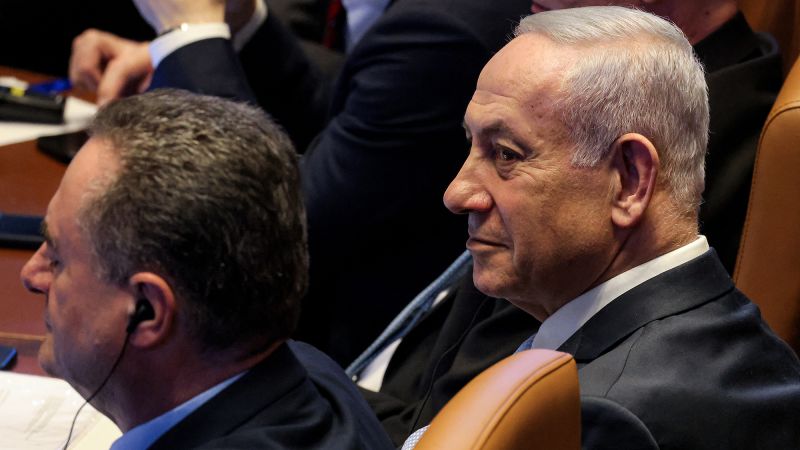As Israeli Prime Minister Benjamin Netanyahu prepares for his third visit to the White House this year, his host has made his expectations clear. US President Donald Trump, who has spoken often about his desire to secure a ceasefire inGaza, said on Tuesday: “We’re looking for it to happen next week.”
Though the two leaders will celebrate the US and Israeli strikes inIran, Gaza is very much on their agenda. “We want to get the hostages back,” Trump said.
Netanyahu, who is set to meet the US president on Monday, faces a critical decision at the crossroads of two very different conflicts: one precise and short, the other brutal and protracted. The long-time Israeli leader held two high-level meetings on Gaza already this week and is expected to hold another on Thursday, according to an Israeli official.
But the government has yet to decide on how to proceed in Gaza, a source familiar with the discussions said. That choice boils down to whether to pursue a ceasefire agreement or to intensify a military bombardment of the enclave that has already killed more than 56,000 Palestinians, as Israel tries to increase pressure on Hamas.
Earlier this week, the Israeli military recommended pursuing a diplomatic path in the strip after more than 20 months of fighting and the elimination of much of Hamas’ senior leadership.
On Tuesday, a military official told CNN that Israel has not fully achieved all of its war goals, but as Hamas’ forces have shrunk and gone into hiding, it has become more difficult to effectively target what remains of the militant group.
“It’s harder now to achieve tactical goals,” the official said. The military could keep pursuing the destruction of Hamas’ military and governance capabilities, they added, but a political agreement could also be effective.
The far-right members of Netanyahu’s government are demanding an intensification of Israel’s campaign.
“No agreements. No partners. No mediators. Only a clear outcome: the destruction of Hamas and the return of the hostages from a position of strength,” said Finance Minister Bezalel Smotrich, head of the Religious Zionism party, on Monday.
But after almost two years of war, others have made clear that the release of the remaining 50 hostages in Gaza is the priority.
“In my opinion, everything must be done to release the hostages. And we are over 600 days late. Everything must be done to bring everyone back – the living and the fallen. Not out of weakness – out of strength,” Minister of Welfare Ya’akov Margi said on Israel’s religious Kol B’ramah radio. Pressed on whether that includes an end to the war, Margi said, “I think we should enter negotiations, and everything should be on the table.”
The Israel Defense Forces (IDF) already controls some 60% of Gaza’s besieged territory, forcing more than two million Palestinians – many of whom have been displaced several times – into shrinking areas near the coast. But negotiations have been stalled for weeks, unable to bridge a key gap. Hamas demands a permanent end to the conflict as part of any ceasefire agreement, while Israel has refused to commit to end the war.
“The IDF has reached the limit of what you can achieve with power,” said Israel Ziv, a retired major general who once led the military’s operations department. “Netanyahu has reached a crossroads, and he must make a choice,” he added.
One path is to leverage the achievements against Iran, Hezbollah and Hamas and push for a regional agreement that could include upgrading relations with Syria and Lebanon, Ziv said. Such an option would end the war in Gaza and secure the release of the hostages, but it risks collapsing Netanyahu’s government if the far-right parties quit the coalition.
“The second path is continuing the war – and even if it’s not officially declared, it would mean the conquest of Gaza,” said Ziv.
Over the weekend, Netanyahu said “many opportunities have opened up” following Israel’s military operations in Iran, including the possibility of bringing home everyone still held captive by Hamas. “Firstly, to rescue the hostages,” he said. “Of course, we will also need to solve the Gaza issue, defeat Hamas, but I believe we will accomplish both missions.”
The comments marked a potentially significant shift in how Netanyahu has laid out Israel’s goals in Gaza. For the vast majority of the war, he has prioritized the defeat of Hamas. In May, he said that was the “supreme objective,” not the return of the hostages.
But after the campaign against Iran, Netanyahu has signaled a newfound flexibility on negotiations, one that may quickly be put to the test at the White House as he meets an American president pushing for a deal.
